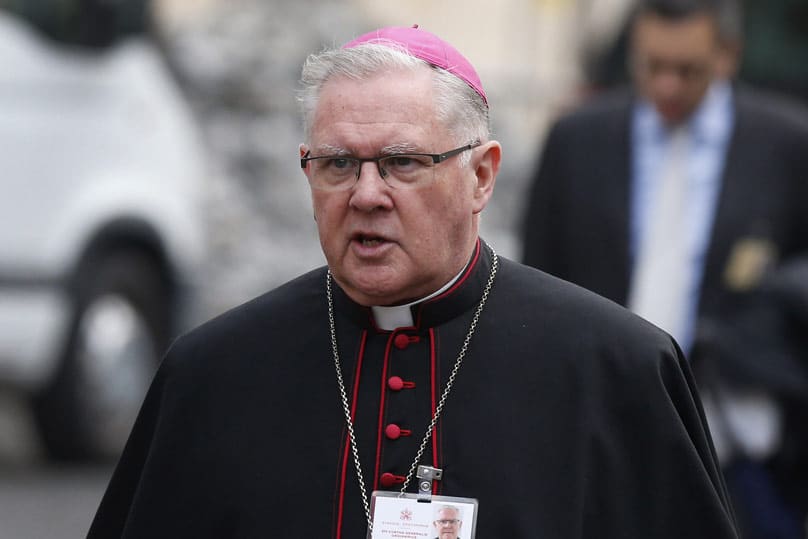
A failure of the Voice referendum would resign Aboriginal people to “heartbreak to the point of loss of faith, frustration to the point of despair, and rejection to the point of alienation,” Voice architect Noel Pearson told Catholics at a forum alongside Archbishop Mark Coleridge of Brisbane and Emeritus Professor Greg Craven on 29 September.
While Mr Pearson encouraged supporters not to despair at recent polling, if the referendum does fail “there is going to be heartbreak to the point of loss of faith,” Mr Pearson said.
“I don’t mean that in a religious sense entirely, I mean it because I tell my church—my little church, the Lutherans—that it is likely we’ll get more Muslims onside than members of my church.
“Heartbreak to the point of loss of faith, loss of faith in the country, loss of faith in Australia. That’s the price, and I want to avoid that price absolutely.
“Frustration to the point of despair; frustration is normal in life, in politics, in policy, in government, in administration. Frustration is just part and parcel, but despair is the thing I’m worried about.
“Finally—rejection to the point of alienation. That’s a price. This will be a rejection, to the point of utmost alienation.
“We’ll still be alive the next day, but we won’t be much proud of where we’ll be at as a country, who we will be as a people, and we’ll be completely bereft in my view about where we go next.”
The forum, hosted by the Liberals for Yes group at St James College Brisbane on 29 September, also featured Uphold and Recognise chairman Sean Gordon and was introduced by Archbishop Coleridge.
The Voice referendum is a “moral question of the first order” that has been reduced to ugly partisan politics, Archbishop Coleridge said, a characterisation shared by the other speakers.
The archbishop said he would vote Yes on 14 October, but respects the right of others to vote No “with a properly formed conscience.”
“There are good and bad reasons for voting both Yes and No,” he said.
“I’m also here because I reject the partisan parameters imposed on the process from the beginning. There was no real attempt at bipartisanship, because political advantage was seen to lie in another direction,” he added.
“Yet this is an issue which concerns not just the 3 per cent who identify as Indigenous but the 100 per cent who identify as Australian, and which therefore cried out for bipartisanship for the sake of national unity.
“The rejection of bipartisanship meant that there was no attempt to unite the nation, and at that point the process began to turn ugly as it has continued to do in the meantime.
“Rather than unite the nation, both sides have sought to demolish the opposition; and this has made an already divided nation still more divided. This has not been Australia at its best.”
Archbishop Coleridge described chronic Indigenous disadvantage as “the running sore at the heart of the nation” and said the Voice could be a “circuit-breaker which can take us beyond the failed gradualism of the past.”
At the same forum, Professor Craven—one of the original architects of the Voice along with Mr Pearson—said Yes supporters should not prematurely concede defeat.
“Do not dare any one of you, to say this referendum is lost. Don’t say it in your heart, and don’t say it to anyone else, lest they believe you,” Professor Craven said.
He compared the Voice referendum not to the successful 1967 vote that gave Indigenous people the right to vote, but to the 1951 referendum that sought to ban the communist party in which Australians voted No to remain a “plural democracy.”
“It’s that kind of political—of social—morality we need to rely on in this referendum winning,” he said.
“And I absolutely agree with His Grace in saying this is not a political question. Not only is it not a political question, it’s not a constitutional question.
“This is a moral question—it’s about an ethical imperative, it’s about what you do, not how you do it.
“And if it’s to win, that’s what we need to focus on. This goes way beyond politics, into the deepest range of philosophy, of ethics, even of religion.”
Mr Gordon said the Voice to Parliament will give Indigenous Australians more opportunity to succeed and provide better value for the taxpayer dollars spent on Indigenous affairs.
The Voice is about fast-tracking economic independence for Indigenous communities through a structural pathway that does not currently exist, allowing communities to step up, be heard and reach their full potential.
“From my experience, it is clear that real tangible benefits are achieved when we consult, listen and act on the voices of Indigenous communities, particularly in identifying practical local solutions that work at the grassroots level,” Mr Gordon said.
Mr Pearson also expressed his deep disappointment with former supporters of the Voice in the Liberal and National parties, who have changed their allegiance since the idea was first conceived in 2014, and with overseas-born Australians who do not accept that for Indigenous people, Australia is their only home.
“I’ve met many Australians who’ve done well in this country, and yet are churlish about whether Indigenous people should be recognised in their home country,” he said.
“They think [Indigenous people] should pull themselves up by their bootstraps. They think they should do the same hard yards they did. They’ve no idea my father couldn’t go to a school.
“The doors of opportunity simply weren’t open. How much farther advanced would we have been had we been treated with some kindness, understanding that the doors of opportunity needed to be opened from the inside.”
